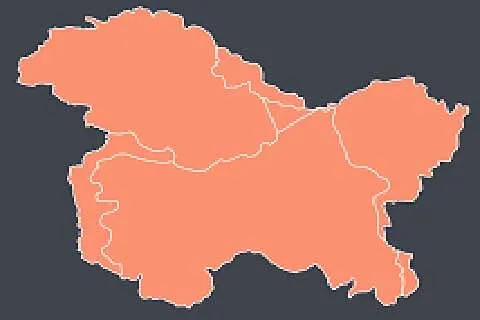Today Kashmir is seeking to come out of its unending sequel of violence that have overlapped its religious and political aspirations, but it is not finding a way out.
It is a serious situation, where there is a clear division between the two sides – one represents the accumulation of frustrations and self-imposed helplessness that has darkened all the exit routes.
The other is quite opposite of it – there is aggression that stems from the overconfidence in the self-belief. Ironically, both the sects are product of the harsh circumstances of the past 30 years.
In simple words, one class has donned the uniform of suppression. It believes that its aspirations have been suppressed by the oppressive forces, and they see and accuse the security forces as their oppressors.
This section refuses to undertake a self-introspection to analyse the real issues that brought about such a situation. They can rarely summon the courage to say anything against the forces that introduced the gun culture.
In this election season, the memories of the 1987 Assembly polls are revived to justify their anger against the system, but they are unable to see the larger picture, for the simple reason that the dictum of the 1987 polls suits them perfectly.
The other class is that of “warriors.” They have waged a waragainst the “oppressors” with guns and explosives hoping that the violent meansthat they have adopted – now graduated to the suicide bombings or the”fidayeen” cult would deliver something that the street protests and stone peltinghave not been able to do all these years.
For example, there is a bizarre frame of thinking in which the Pulwama suicide bombing that killed more than 40 CRPF men is seen as a game changer.
That one militant – suicide bomber- can inflict such heavy casualties on the security forces that rattle the whole Indian nation and the matters take such a turn that Kashmir issue gets internationalised by a simple act of few seconds and a fire ball. If that is the objective, that has been achieved.
The larger question, however, is that whether the Pulwama has delivered anything to Kashmir. It is nowhere close to a solution that it is seeking in different forms, because the Kashmiri leadership, if there is any, has no single roadmap.
The leadership is caught in its own cobweb. In fact, the suicide bombing, whatever be the reasoning and explanation by the local leadership or by Pakistan, has given what Kashmiri leadership calls “struggle” and altogether different definition that Kashmiris are lothe to hear.
At this moment, what is required is that Kashmir must look to the future and cannot ever go back to the dark days of the past 30 years in which it has only tragedies to stare at.
The tragedies are countless and those have not only torn apart the lives of the people living in the Valley, but also that of other communities across the country and in some foreign countries.
For Delhi, there is an initiative that it should take without wasting time. It should understand the outrage that defines the public mood in Kashmir.
There are more than one reasons for that, there is a feeling that Delhi is pushing all classes and sections of Kashmiris to wall and inflict collective punishment.
Delhi must take all the measures that it deems fit for the national security but not without asking a question, can there be a fool proof security for the nation along the borders and the hinterland in Jammu and Kashmir without the cooperation of the people.
The public is the best asset for the national security, has that advantage been frittered away. It is a moment of introspection.
Kashmiri public is intelligent enough to know that cynicism and the empty symbols of dialogue without a clear mandate offer no solution.
Those can be, at best, some optics, and some rhetorical sound bytes, but not the real time work and progress. The Dinesh war Sharma experiment is there for all to see. It was doomed from the day one, and finally it met its fate.
If Delhi has to be clear in its dealing with Kashmir, so will have to be Kashmiri leadership. Pakistan is a party to the “dispute” is a fashionable statement, and it will assume meaning only when the real nature of the “dispute” is acknowledged by Pakistan.
Islamabad knows that where it is, historically, geographically and diplomatically. The seat on the table is earned when everything real is put on table, not by the digressions.
It is prudent that both Delhi and Islamabad realise that simply setting table on Kashmir is not important, but also placing of the real issues. Kashmir will do a yeoman’s service if it gives a firm unflappable roadmap to both of them.






